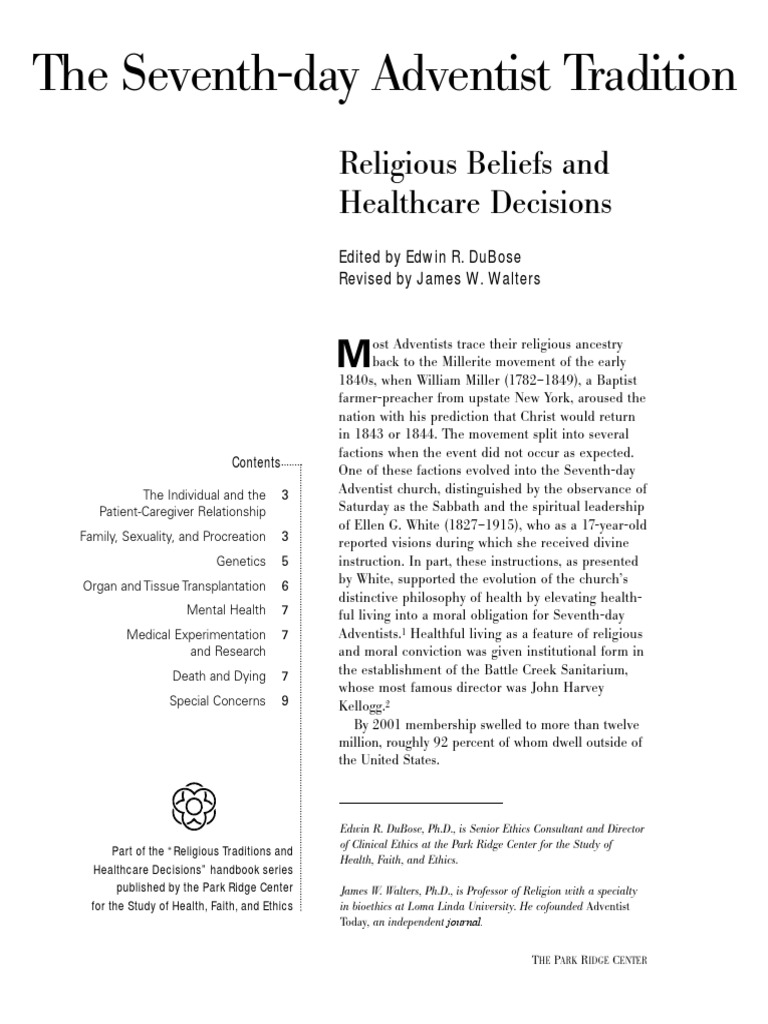The Seventh-Day Adventist Church, a denomination within Christianity, presents a fascinating tapestry of beliefs that interweave prophetic interpretations with a focus on holistic health. Established in the mid-19th century in the United States, this faith tradition has burgeoned into a global movement, characterized by a distinctive set of doctrines and practices that merit examination.
At the heart of the Seventh-Day Adventist faith lies a profound reverence for biblical prophecy. Adventists maintain that the Bible serves not merely as a historical account, but as a living document imbued with divine foreknowledge. Central to their eschatology is the Second Coming of Christ, an event they fervently believe to be imminent. This conviction is rooted in the prophetic visions of figures such as William Miller, whose interpretations of the prophetic schedule in the Book of Daniel ignited a movement seeking clarity on Christ’s return. Could it be that the urgency of this belief fosters a unique sense of purpose and motivation among adherents?
The church’s name itself encapsulates its fundamental tenets. The term “Adventist” signifies a focus on the Advent, or the anticipated return of Jesus Christ. Meanwhile, “Seventh-Day” underscores their adherence to the Sabbath, observed from Friday sundown to Saturday sundown. This day of rest is not mere tradition for Adventists; it is a theological cornerstone, emphasizing the importance of divine creation and the need for spiritual rejuvenation. The Sabbath serves as a time for worship, reflection, and community, illuminating the intricate relationship between their faith and daily life.
Theologically, Seventh-Day Adventists uphold the importance of the original creation story, particularly God’s rest on the seventh day, which they view as a model for human existence. To many, this raises an intriguing question: in a world perpetually driven by productivity and haste, what might we rediscover through the observance of a literal day of rest? This challenge to modern societal norms compels a reevaluation of how time and rest are perceived in contemporary life.
Moreover, the intersection of health and spirituality stands out as another distinctive feature of Seventh-Day Adventism. For them, physical well-being is intrinsically linked to spiritual vitality. This connection can be traced back to the writings of Ellen G. White, one of the church’s founders, whose emphasis on health reform has led Adventists to champion vegetarianism, temperance, and holistic health practices. The church operates numerous healthcare institutions globally, advocating for a lifestyle that promotes wellness alongside faith.
The health message is encapsulated in the belief that the body is a temple, deserving of care and respect. This call for healthy living begs the question: What is the spiritual significance of our physical bodies? It invites deeper contemplation of the ways in which our choices about diet, exercise, and overall wellness reflect our values and beliefs.
Adventist theology also emphasizes the concept of stewardship—caring for the earth and its resources. This doctrine extends beyond individual health into the realm of environmental responsibility. In a time when ecological crises loom large, Adventists advocate for sustainable practices, aligning their faith with a broader commitment to creation care. They see the natural world as a reflection of the divine, deserving of protection and reverence.
Another essential aspect of Seventh-Day Adventist beliefs is the “Great Controversy” theme, which articulates the ongoing struggle between good and evil as depicted in scripture. This worldview equips adherents with a framework to make sense of suffering and injustice in the world, offering hope that God will ultimately triumph. By situating personal experiences within this cosmic conflict, believers find purpose and unity in their spiritual journey.
In addition to these theological pursuits, Seventh-Day Adventism boasts a rich tradition of community and fellowship. The church places a high value on congregational life, with local churches functioning as vibrant hubs of worship, education, and outreach. This model fosters a sense of belonging, empowering individuals and families to grow together in faith. The communal aspect also raises a pertinent challenge: how can faith communities effectively navigate the diverse needs and experiences of their members while remaining true to their core convictions?
Furthermore, the global presence of the Seventh-Day Adventist Church reflects its missionary zeal. Spanning over 200 countries, the denomination is dedicated to spreading its message through various mediums, including education, healthcare, and humanitarian initiatives. This global perspective encourages Adventists to engage with cultures worldwide, inviting dialogue and exchange that transcend geographical boundaries.
The Seventh-Day Adventist faith, steeped in prophetic tradition and health consciousness, invites individuals to explore profound questions about purpose, community, and stewardship. As believers strive to live out their convictions in a complex world, they are challenged not only to contemplate their beliefs but also to embody them in tangible ways. By fostering a relationship between faith, health, and environmental responsibility, Seventh-Day Adventism offers a compelling response to the inquiries that characterize the modern human experience.
Ultimately, the journey of faith within the Seventh-Day Adventist Church is both individual and communal. As members grapple with the intricacies of scripture, tradition, and their own lived experiences, they contribute to a living faith that remains dynamic and relevant, transcending time and context. In an age where hope often seems scarce, the message of Adventism resounds with a clarion call to embrace faith, health, and community as integral components of the Christian walk.



